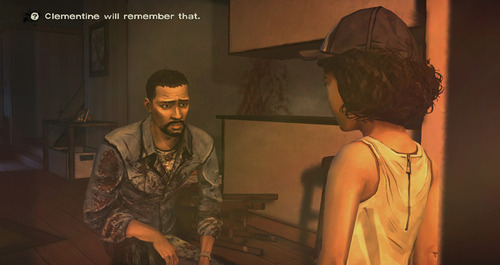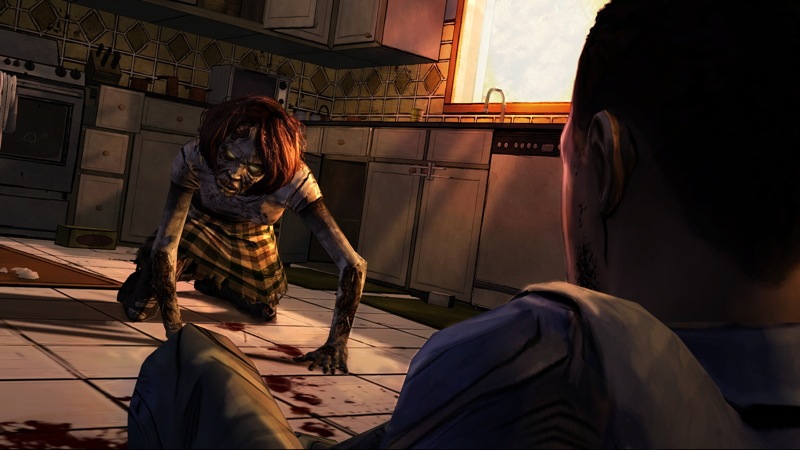The Walking Dead
Telltale's Walking Dead was a genuine surprise. This was a studio that had previously survived on lackluster adventure games, with the occasional spark of brilliance, making a licensed game (already a red flag in itself) based on a property that had lost anything resembling decent writing or originality at least two or three years prior, in my absolute least favorite genre, point-and-click adventure.
And it was brilliant.
It's hard to describe exactly what made me engage with The Walking Dead so much. It doesn't do much to innovate. The core gameplay mechanics are uninteresting, and the storyline is rather played-out. Why exactly do I love this game so much?
It's the interplay of all those aspects, how they support one another. The storyline by itself is a decently written zombie story, with some surprisingly well written characters, and these characters are what carry the entire game through a curious domino-effect., where caring about the characters leads you to care about the story, which in turn makes you care about the gameplay, and so on and so forth.
Special props to Telltale for both the characters of Clementine and Lee, which turn what would otherwise be a really good experience into a truly great one. Clementine has seen plenty of praise by the internet, and deservedly so: She is quite possibly the only well-written child in videogames, and, even if she wasn't, is a complex and interesting character in her own right. Clementine feels like a real person: She goes through emotional ups and downs, not always with a clear reason. She's not a Princess Peach to be saved, nor is she a Bayonetta to go out and kick ridiculous amounts of ass: Clementine is a smart, competent young girl who can look after herself as much as any other eight year-old could in a zombie apocalypse.
However, I think the character of Lee often gets overlooked. It's amazing how much characterization Telltale managed to write into a character whose words are almost entirely chosen by the player, pulling off in the space of one game what BioWare couldn't properly pull off with Commander Shepard in the space of three. Lee is not only a great player character, but a good character in his own right: struggling between what he feels is his moral obligation to protect Clementine, his moral obligation to protect the group, and his own survival instinct.
I could stay here and praise each character by turn: I could tell you how brilliantly Kenny's steadfast loyalty is pulled off, or describe the rage and frustration that I feel every time I come up against Larry's rampant selfishness, but that would make this run entirely too long. Let it be said that almost every person you meet ranks between the best characters that have graced a videogame.
The visual style is amazing, opting for a cartoonish, cell-shaded look reminiscent of the original comics, and shying away from the unpleasant-looking and excessively gritty style of the TV show. This forces Telltale to work around action scenes, with human deaths almost always occurring off-screen (giving them that Jaws "shadow of the monster" feeling) and the quite rare zombie kills being shocking more through the brute force of the action than the effect of said action on the zombie.
If this were a review, gameplay would be were I'd dock a few points, but it's still brilliant. Early on, puzzles are slightly too complex, creating a frustrating distraction from the main meat of the game: The story and interactions between characters. However, after Episode 2, they become considerably simpler, and the gameplay instead serves to reinforce the story: simple but time-expanding puzzles whilst a wave of zombies approaches to give you that extra punch of tension, a sweep of an area in a moment of panic for Clementine's safety, that sort of thing. It's not the star of the game, but it definitely gives the story just that much more kick. What's most important is that it does that crucial thing I've always insisted on: Storytelling is done through
the mechanics of the game, and that makes everything a lot more affecting.
The dialogue system is probably the best part. It's a simple menu with a few choices, with a timer that forces you to make quick decisions, which lead to you sometimes saying something you'll regret. Something brilliant is that silence is, for every dialogue choice, an option. The most innovative feature of the game is in the instant feedback
pop-ups that show up at the top left of the screen, telling you that your actions will have consequences: lying to someone might net you a "Bob will remember that". At first, these seem like they'd ruin what actions will have consequences, but the true brilliance lies in that these pop-ups are not always relevant. Bob might remember that you told him you had unlimited food, but it doesn't make a difference if he gets eaten by zombies on the way to said non-existent food, or if you happen to actually
find a real source of unlimited food. This gives the game incredible amounts of tension, thinking back, and requires you be a crafty speaker.
I also have to give props for not including many actions scenes at all, at most one per hour or two. What fights are present in the game feel desperate and brutal, an effect that would've been lost in a game more focused on popping zombie heads: The zombies truly feel like a threat with how rarely you dispatch even one.
Now, I haven't played what's out of Season Two yet: I think great part of what drove me to enjoy the first game so much was playing all the episodes in a row, not taking month gaps. When all of Season Two is out, I will buy and play it. I am similarly impatiently waiting for all of The Wolf Among Us and Telltale's Game of Thrones to come out.
The Walking Dead is not the best game I've ever played. That honor still goes to either Deus Ex or the first Amnesia: Both of those games were objectively better constructed than Walking Dead is. Nonetheless, neither of them affected me as deeply and strongly as Walking Dead
Telltale's The Walking Dead: Season One is not only my favorite game that I played in 2013, but my favorite game of all time, after seven years of the spot being taken up by Deus Ex.
Telltale's Walking Dead was a genuine surprise. This was a studio that had previously survived on lackluster adventure games, with the occasional spark of brilliance, making a licensed game (already a red flag in itself) based on a property that had lost anything resembling decent writing or originality at least two or three years prior, in my absolute least favorite genre, point-and-click adventure.
And it was brilliant.
 |
| Don't judge this game by its cover. And title. And dev. |
It's the interplay of all those aspects, how they support one another. The storyline by itself is a decently written zombie story, with some surprisingly well written characters, and these characters are what carry the entire game through a curious domino-effect., where caring about the characters leads you to care about the story, which in turn makes you care about the gameplay, and so on and so forth.
Special props to Telltale for both the characters of Clementine and Lee, which turn what would otherwise be a really good experience into a truly great one. Clementine has seen plenty of praise by the internet, and deservedly so: She is quite possibly the only well-written child in videogames, and, even if she wasn't, is a complex and interesting character in her own right. Clementine feels like a real person: She goes through emotional ups and downs, not always with a clear reason. She's not a Princess Peach to be saved, nor is she a Bayonetta to go out and kick ridiculous amounts of ass: Clementine is a smart, competent young girl who can look after herself as much as any other eight year-old could in a zombie apocalypse.
 |
| Tenderness: Something you see entirely too little of in games |
I could stay here and praise each character by turn: I could tell you how brilliantly Kenny's steadfast loyalty is pulled off, or describe the rage and frustration that I feel every time I come up against Larry's rampant selfishness, but that would make this run entirely too long. Let it be said that almost every person you meet ranks between the best characters that have graced a videogame.
 |
| Believe it or not, all great characters |
the mechanics of the game, and that makes everything a lot more affecting.
 |
| Those little text-boxes terrify you as much as zombies. |
pop-ups that show up at the top left of the screen, telling you that your actions will have consequences: lying to someone might net you a "Bob will remember that". At first, these seem like they'd ruin what actions will have consequences, but the true brilliance lies in that these pop-ups are not always relevant. Bob might remember that you told him you had unlimited food, but it doesn't make a difference if he gets eaten by zombies on the way to said non-existent food, or if you happen to actually
find a real source of unlimited food. This gives the game incredible amounts of tension, thinking back, and requires you be a crafty speaker.
 |
| Not as terrifying in Left4Dead |
Now, I haven't played what's out of Season Two yet: I think great part of what drove me to enjoy the first game so much was playing all the episodes in a row, not taking month gaps. When all of Season Two is out, I will buy and play it. I am similarly impatiently waiting for all of The Wolf Among Us and Telltale's Game of Thrones to come out.
The Walking Dead is not the best game I've ever played. That honor still goes to either Deus Ex or the first Amnesia: Both of those games were objectively better constructed than Walking Dead is. Nonetheless, neither of them affected me as deeply and strongly as Walking Dead
Telltale's The Walking Dead: Season One is not only my favorite game that I played in 2013, but my favorite game of all time, after seven years of the spot being taken up by Deus Ex.
No hay comentarios:
Publicar un comentario